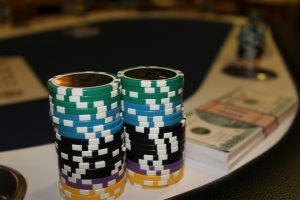Winning at a casino always feels good, but staying ahead means knowing when to stop. That rush you get after a big win? It’s part of the game. But it’s also the moment when players often lose focus, chasing more instead of walking away. Smart gambling isn’t just about the odds. It’s about mindset, timing, and building habits that keep your winnings where they belong: in your account, not automatically back on the table.
When Winning is the Danger Zone
Winning can be more daring than losing. The excitement hits, your brain lights up, and suddenly every spin, hand, or bet feels like it could lead to something bigger. That’s by design. Every light, sound, and layout is built to keep you locked in, betting more. Understanding those psychological cues is the first step in protecting your gains.
Why Your Brain Plays Along: The Reward Cycle
Casino games rely on another powerful psychological pattern: unpredictable rewards. It’s what makes slot machines addictive and keeps players chasing “just one more” round. Every small win, or even a near win, triggers a dopamine rush that fuels more play.
Pause often. Set a timer. And check in with yourself. That spike of excitement you feel? It’s natural, but it doesn’t mean you’re on a winning streak. It means the game is doing its job. Recognizing that lets you take back control before momentum leads you down the wrong path.
Fast Withdrawals, Fewer Excuses
The rise of fast withdrawal casinos changes the game. No more waiting days to get paid. These platforms make it easier to collect your money while you’re still in a smart headspace.
Being able to move funds quickly means less temptation to keep playing. It also makes withdrawal goals more realistic: you’re just a few clicks from locking in your win.
The Tools That Make It Happen
Speed comes down to method. E-wallets like PayPal or Skrill get you your money fast. Crypto payments like Bitcoin are processed in minutes. Some casinos, like those over at fastwithdrawal.casino, offer instant bank transfers or prepaid cards that cut out delays altogether.
The faster your withdrawal, the lower your chance of giving in to the urge to keep betting. It’s not just convenience, it’s protection.
Staying Safe While Getting Paid
Fast payouts are only as good as the platform behind them. Stick to licensed operators. Complete your ID checks early. Read the terms so you know which payment options are truly instant.
Use secure wallets. Enable 2FA. Set spending limits. Keep your private keys private. Fast withdrawals should feel easy, but never at the cost of safety.
The Illusion of Control: Why You Think You’ve Got This
Some games feel like they offer control, like your choices are shaping the outcome. But often, that’s an illusion. Whether it’s “picking” a slot bonus or playing a hand in blackjack, randomness is always in the mix, and it’s a growing market.
Enjoy the engagement, but don’t mistake involvement for influence. Set clear limits before you start. Know what part of the game is luck and what’s actually skill. The moment you confuse the two, the game starts winning, not you.
Withdrawals Aren’t Optional, They’re the Win Condition
Walking away with money in your account is the real win. Setting profit goals and stop-loss limits turns withdrawal into a planned move, not a last-minute decision.
Write down your goals. Stick to your numbers. Use built-in tools to lock in wins or freeze deposits. The more structured your play, the fewer decisions you’ll have to make when your emotions are running high. That structure is what turns fun into smart.
Chasing Losses and Pushing Wins: The Emotional Loop
Losses spark frustration. Wins spark greed. Both push you to keep playing, and both are fueled by emotion, not logic. It’s called escalating commitment, and it’s one of the most common side effects you’ll feel when playing.
You might tell yourself you’ll walk after the next win. Or that you just need to recover what you lost. But those thoughts usually lead to more bets, not better outcomes.
The fix? Pause after any big swing, win or loss. Take a breath, step away, and remember why you’re playing in the first place. Protecting your balance is often safer than chasing numbers.
Make Withdrawing a Habit
Treat your withdrawal like a win, not an afterthought. Cashing out should be a regular part of your session, not a backup plan if things go wrong.
Build a habit: the moment you hit your goal, pull the money. Reward yourself. Move it to savings. Over time, this pattern becomes muscle memory. You’ll stop seeing withdrawals as “giving up” and start seeing them as the real payoff.
Practical Tricks That Work
Mindfulness matters. Pause. Ask yourself how you’re feeling. Are you chasing? Coasting? Looking for one last thrill? The more honest you are, the better you play.

Use visual anchors: notes in your wallet, timers, reminders on your screen. Build small rituals, like always withdrawing after a certain win, or always stepping away after an hour. These habits don’t rely on willpower, they create momentum in the right direction.
Smarter Play Means More Kept Winnings
Gambling can be fun, exciting, and rewarding. But only if you stay in control. That means understanding how the game plays you, and learning how to play it back. Withdraw when you win. Set your limits. And use fast payout tools to lock in what you’ve earned.
In the end, responsible play is less about avoiding risk and more about knowing how to cash out before the fun turns costly.






 Your total news and information resource for all things Science, Technology, Engineering / Mathematics, Art, and Medicine / Health.
Your total news and information resource for all things Science, Technology, Engineering / Mathematics, Art, and Medicine / Health.
Leave a Comment